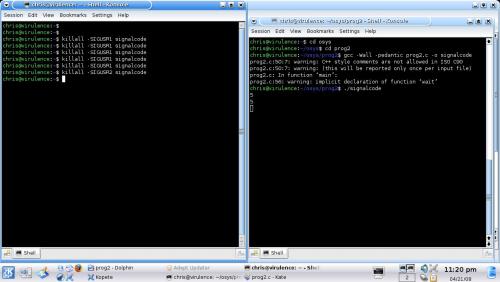#include <signal.h>
#include <stdio.h>
#include <string.h>
#include <sys/types.h>
#include <unistd.h>
sig_atomic_t count = 0;
void handler (int signal_number) {
count++;
}
void handler2 (int signal_number) {
if(count >= 10) {
printf("You have counted too many digits.\n"
"You wanted %d and you can only use 9.\n"
"I can't just grow an extra finger or toe people. Start over.\n",count);
count = 0;
}
else {
printf("%d\n",count);
count = 0;
}
}
void handler3 (int signal_number) {
printf("Liar! It is not dead (just wounded).\n") ;
}
int main(int argc, char ** argv) {
struct sigaction sa1, sa2, sa3;
int pid;
memset (&sa1, 0, sizeof (sa1));
sa1.sa_handler = &handler;
sigaction(SIGUSR1,&sa1,NULL);
memset (&sa2,0,sizeof(sa2));
sa2.sa_handler = &handler2;
sigaction(SIGUSR2,&sa2,NULL);
memset (&sa3,0,sizeof(sa2));
sa3.sa_handler = &handler3;
sigaction(SIGCHLD,&sa3,NULL);
pid = fork();
if (pid != 0) {
for(;;) {
sleep(1000);
//printf("I'm awake, where's the coffee\n");
}
}
else {
for(;;);
}
wait(pid);
}
Thanks in advance!
Chris















 Sign In
Sign In Create Account
Create Account

